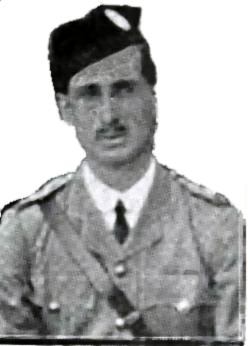Alexander MacDuff
I wish to introduce you to a relative of mine whose name appears on the Scone War memorial. He was a second cousin of my Grandfather, and his name was Captain Alexander Macduff. Capt Macduff’s father was also called Alexander Macduff, and he was the proprietor of Bonhard estate, and the County Councillor for Scone. Bonhard had belonged to the Macduffs since it was purchased from the Grant family in 1742. Each of the five lairds was called Alexander. Had he survived the war, Capt Macduff would have, in time, succeeded as the sixth Alexander Macduff of Bonhard. That was not to be.
Young Alexander was born on 6th July 1884 at Bonhard. He had a typical childhood for someone of his background. He was sent away to school, first to prep at Cargilfield in Edinburgh and then to Winchester College in the south of England. He was the first of his family to be sent away to school. His father and grandfather had been schooled in Edinburgh, where the family also had a house. In 1902, Alexander went up to Oxford, to New College. He did not graduate from the university, though. In 1903 he had joined the University Volunteer Battalion of the Oxfordshire Light Infantry and obviously took a liking to the military life. In 1904, Alexander applied to join the Army, and sat an exam for university candidates seeking a commission. He came top in his year and was commissioned into the 1st Battalion, The Queen’s Own Cameron Highlanders on 19th April 1905. He didn’t remain with the 1st Battalion long, though, and transferred to the 2nd Battalion in July 1905, aged 21. The Second Battalion spent the decade before the war in service away from home, initially in South Africa (the Boer War had ended just three years earlier) and then in China and India. In August 1914, when war was declared, Alexander and his Battalion were in Poona, India. They left India in October 1914, arrived in England in November and were in France by 20th December. A European winter was a shock to the system for the officers and men of the 2nd Camerons after a decade in the sun! A book written about the “Scone War Dead” after the war puts it well when it says that they were “severely tried by the climate”. Alexander had been promoted to Captain in September 1914. He was a company commander, in charge of up to two hundred men. He appears to have epitomised the British Army officer of the period. He was brave, if not somewhat cavalier. The historian of his regiment describes him as “that gallant Cameron officer”. He seems to have had scant regard for his own welfare, and certainly “led from the front”! He was wounded in the field at the battle of St Eloi in March 1915, but recovered quickly, and rejoined the fray immediately. On 22nd April 1915, the 2nd Camerons were sent in as reinforcements to the infamous Hill 60. This was the beginning of the Second Battle of Ypres. Several days of intense fighting had wrested this important position from German control, and the Camerons were to assist in keeping hold of it. On 24th April 1915, Alexander appears to have been on Hill 60, close to the front trench, when a mine exploded. The mine created a crater forty feet deep. Alexander’s death was instant. Like so many others, he has no grave. There would be little to place in it. The Camerons were withdrawn from Hill 60 on 28th April. They had lost two company commanders, a junior officer and a senior NCO. They had held Hill 60. It fell into enemy hands once again just a week after the Camerons left. Between 21st April and 18th May 1915, the second battalion suffered 671 casualties. Alexander is commemorated in a number of places: at Cargilfield, at Winchester and at New College. He was also remembered by his friends and relations in Scone. He is commemorated at Scone Old, where his father was an elder. After the war, his father gifted the original Church House to the village in memory of his fallen son. It was opened in October 1920. For over sixty years, it served as a meeting place, and as the home of the beadle. That building has since been replaced by the 1980s church hall, but the new hall has a room, named the Macduff Room, on the wall of which hangs Alexander’s picture.
Alexander is also commemorated on the Scone War Memorial, along with seventy others. I did not know Alexander, nor did I know anyone who knew him. I cannot tell you whether he told amusing anecdotes, or if he was a serious character, or whether he was kind, or abrasive…….
Robert Macduff-Duncan
June 2014

